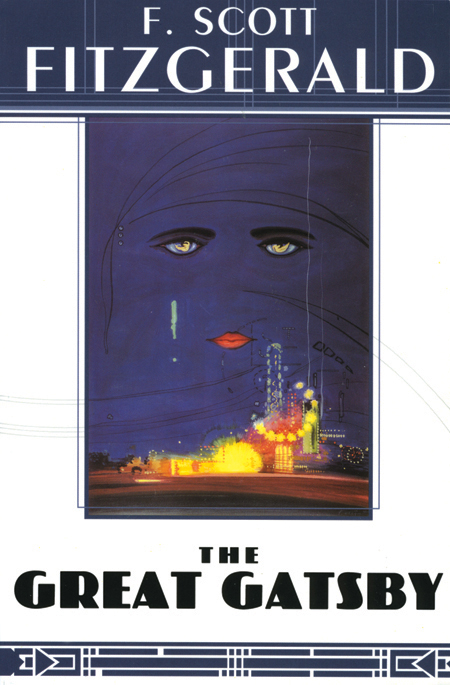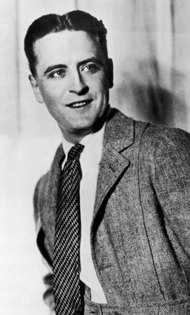The Great Gatsby

Overview
The Great Gatsby may be the most popular classic in modern American fiction. Since its publication in 1925, Fitzgerald's masterpiece has become a touchstone for generations of readers and writers, many of whom reread it every few years as a ritual of imaginative renewal. The story of Jay Gatsby's desperate quest to win back his first love reverberates with themes at once characteristically American and universally human, among them the importance of honesty, the temptations of wealth, and the struggle to escape the past. Though The Great Gatsby runs to fewer than two hundred pages, there is no bigger read in American literature.
"Show me a hero and I will write you a tragedy." —from The Notebooks of F. Scott Fitzgerald
Overview
The Great Gatsby may be the most popular classic in modern American fiction. Since its publication in 1925, Fitzgerald's masterpiece has become a touchstone for generations of readers and writers, many of whom reread it every few years as a ritual of imaginative renewal. The story of Jay Gatsby's desperate quest to win back his first love reverberates with themes at once characteristically American and universally human, among them the importance of honesty, the temptations of wealth, and the struggle to escape the past. Though The Great Gatsby runs to fewer than two hundred pages, there is no bigger read in American literature.
Introduction to the Book
F. Scott Fitzgerald's 1925 novel The Great Gatsby is a tragic love story, a mystery, and a social commentary on American life. Although it was not a commercial success for Fitzgerald during his lifetime, this lyrical novel has become an acclaimed masterpiece read and taught throughout the world.
Unfolding in nine concise chapters, The Great Gatsby concerns the wasteful lives of four wealthy characters as observed by their acquaintance, narrator Nick Carraway. Like Fitzgerald himself, Nick is from Minnesota, attended an Ivy League university, served in the U.S. Army during World War I, moved to New York after the war, and questions—even while participating in—high society.
Having left the Midwest to work in the bond business in the summer of 1922, Nick settles in West Egg, Long Island, among the nouveau riche epitomized by his next-door neighbor Jay Gatsby. A mysterious man of thirty, Gatsby is the subject of endless fascination to the guests at his lavish all-night parties. He is rumored to be a hero of the Great War. Others say he served as a German spy. Gatsby claims to have attended Oxford University, but the evidence is suspect. As Nick learns more about Gatsby, every detail about him seems questionable, except his love for the charming Daisy Buchanan.
Jay Gatsby's decadent parties are thrown with one goal: to attract Daisy, who lives across the bay in the more fashionable East Egg. From the lawn of his sprawling mansion, Gatsby can see the green light glowing on her dock, which becomes a symbol in the novel of an unreachable treasure, the "future that year by year recedes before us."
Though Daisy is a married socialite and a mother, Gatsby still worships her as his "golden girl." They first met when she was a young lady from an affluent family and he was a working-class military officer. Daisy pledged to wait for his return from the war. Instead she married Tom Buchanan, a wealthy classmate of Nick's. Having obtained a great fortune, Gatsby sets out to win her back again.
A profound indictment of class privilege in the Jazz Age and beyond, The Great Gatsby explores the conflict between decency and self-indulgence. In the novel's conclusion, the characters collide, leaving human wreckage in their wake.
"At his lips' touch she blossomed for him like a flower and the incarnation was complete."
— from The Great Gatsby
Major Characters in the Book
Nick Carraway
Nick, a young Midwesterner educated at Yale, is the novel's narrator. When he moves to the West Egg area of Long Island, he joins the lavish social world of Tom, Jordan, Gatsby, and his cousin Daisy.
Jay Gatsby
The handsome, mysterious Gatsby, who lives in a mansion next door to Nick's cottage, is known for his lavish parties. Nick, whom he trusts, gradually learns about Gatsby's past and his love for Daisy.
Daisy Buchanan
Beautiful, charming, and spoiled, Daisy is the object of Gatsby's love. Her caprice and materialism lead her to marry Tom Buchanan.
Tom Buchanan
From an enormously wealthy Chicago family, Tom is a former Yale football star who sees himself at the top of an exclusive social hierarchy. He is conceited, violent, racist, and unfaithful.
Jordan Baker
Daisy's friend Jordan epitomizes the modern woman of the 1920s. A liberated, competitive golfer, she is firmly established in high society. She both attracts and repels Nick as a romantic interest.
George Wilson
The owner of an auto garage at the edge of the valley of ashes, George finds his only happiness through his faithless wife, Myrtle.
Myrtle Wilson
Myrtle dreams of belonging to a higher social class than George can offer. Vivacious and sensual, she hopes her adulterous affair will lead to a life of glamour.
- The novel's action occurs in 1922 between June and September. How does Nick's nonchronological narration shape your response to the events surrounding the mystery of Jay Gatsby?
- Nick believes he is an honest, nonjudgemental narrator. Do you agree?
- Gatsby believes that the past can be repeated. Is he right?
- Why does Daisy sob into the "thick folds" of Gatsby's beautiful shirts?
- What do the faded eyes of Doctor T. J. Eckleburg symbolize? Is there a connection between this billboard and the green light at the end of Daisy's dock?
- Perhaps the novel's climax occurs when Gatsby confronts Tom in New York. Did Daisy's ultimate choice surprise you? Is it consistent with her character?
- Do you agree with Nick's final assertion that Gatsby is "worth the whole damn bunch put together"? Why or why not?
- How does Fitzgerald foreshadow the tragedies at the end?
- Does the novel critique or uphold the values of the Jazz Age and the fears of the Lost Generation?
- Fitzgerald wrote, "You don't write because you want to say something, you write because you have something to say." What did he have to say in Gatsby?
- Fitzgerald scholar Matthew J. Bruccoli claims: "The Great Gatsby does not proclaim the nobility of the human spirit; it is not politically correct; it does not reveal how to solve the problems of life; it delivers no fashionable or comforting messages. It is just a masterpiece." Do you agree?


